Cannes Film Festival rings the changes
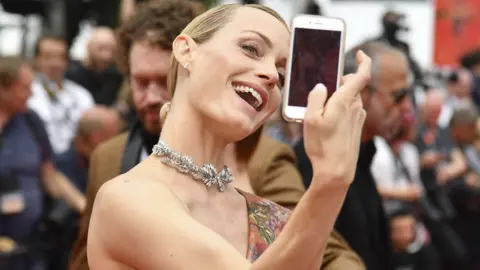 Getty Images
Getty ImagesThe Cannes Film Festival kicks off later, one day earlier than normal, with a number of new measures set to ensure it won't be business as usual.
Guests taking selfies on the red carpet risk being shut out of screenings in an attempt to stamp out the practice.
Press screenings for films having their world premieres at the festival will no longer be held in advance.
The festival will also work with the French government to set up a helpline for women to report sexual harassment.
It follows allegations that producer Harvey Weinstein raped one actress and behaved inappropriately to others while attending previous festivals.
Weinstein has denied all allegations of non-consensual sexual activity.
This year's festival is the first to be held since the entertainment industry became engulfed in a sexual harassment scandal.
The #MeToo and Time's Up movements are sure to be referenced by those attending the event, which runs until 19 May.
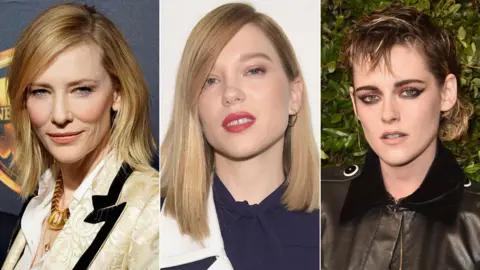 EPA/Getty Images
EPA/Getty ImagesAmong the main competition jury is French actress Lea Seydoux, one of many to accuse Weinstein of making unwelcome advances.
The jury will be chaired by Australian Oscar winner Cate Blanchett and include Kristen Stewart, star of the Twilight films.
All three stars have worked with Woody Allen, who has been accused by his adopted daughter Dylan Farrow of sexually abusing her as a child.
A number of prominent actors have distanced themselves from the director, who has repeatedly denied the allegations.
Female directors in minority
Women outnumber men by five to four on this year's jury, which also includes Selma director Ava DuVernay and Burundian songwriter Khadja Nin.
The panel is completed by Chinese actor Chang Chen and a trio of male directors - France's Robert Guediguian, Canada's Denis Villeneuve and Russia's Andrey Zvyagintsev.
In the competition line-up itself, though, women are very much in the minority. Of the 21 films in contention, only three have female directors - the same number as last year.
They are France's Eva Husson, Lebanon's Nadine Labaki and Italy's Alice Rohrwacher - the only one of the three to have previously been in competition.
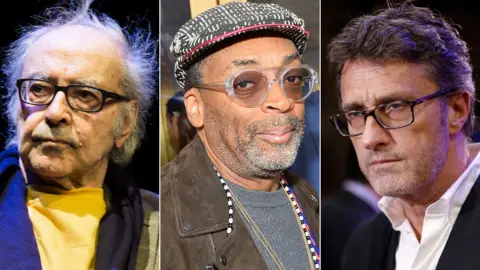 EPA/Getty Images
EPA/Getty ImagesSpike Lee, Jean-Luc Godard and Pawel Pawlikowski are among the male directors in the running for the prestigious Palme d'Or award.
They are joined by a raft of less familiar names in a line-up that has been described as "surprisingly fresh" by Cannes standards.
Other films eligible for the event's highest honour include Three Faces, whose Iranian director, Jafar Panahi, is banned from leaving his country.
The French authorities have appealed to Iran's government to relax its travel ban and allow Panahi to attend.
It is doubtful too whether the Russian director Kirill Serebrennikov, whose film Leto is in competition, will be present.
The theatre and film director was put under house arrest last year after being arrested on fraud charges.
Controversy and comebacks
Further controversy swirls around the Kenyan film Rafiki, which will be shown at the festival as part of the Un Certain Regard sidebar.
The film, a love story about two young women, has been banned in Kenya due to its lesbian storyline.
And then there is The House That Jack Built, a film about a serial killer (Matt Dillon), the inclusion of which marks Lars von Trier's return to the festival.
The Danish director was expelled from Cannes in 2011 after claiming to "understand" and "sympathise with" Adolf Hitler at a press conference.
Last year von Trier denied he had sexually harassed Bjork after the Icelandic singer accused a director she did not name of behaving inappropriately.
Von Trier was the director of Bjork's only film to date - 2000 Palme d'Or recipient Dancer in the Dark.
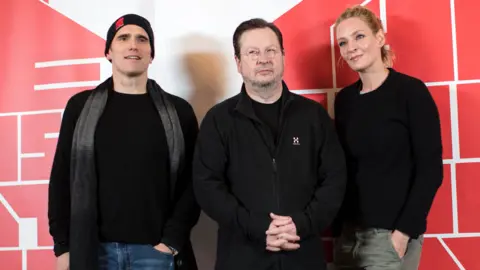 Getty Images
Getty ImagesThis year's festival will open with Everybody Knows, a psychological thriller starring husband and wife actors Javier Bardem and Penelope Cruz.
It will close next week with The Man Who Killed Don Quixote, Terry Gilliam's oft-postponed retelling of the Miguel de Cervantes classic.
That screening might be cancelled, however, if one of its former backers prevails in a legal challenge to have it blocked.
Paulo Branco - who was at Gilliam's side when the project was resurrected in 2016 - claims the film cannot be shown without his permission.
Gilliam, who was born in America and became a UK subject in 1968, is one of the few British filmmakers with a presence at this year's Cannes.
Their small number includes the Scottish director Kevin Macdonald, whose documentary about singer Whitney Houston will have a late-night screening.
Christopher Nolan will be attending the festival, but only to host a 70mm screening of Stanley Kubrick's sci-fi classic 2001: A Space Odyssey.
The film sci-fi fans are really looking forward to, though, is Solo: A Star Wars Story, which will have its first screening at Cannes.
Expect to see stormtroopers patrolling the red carpet on 15 May - provided, of course, they don't take any selfies.
Selfies are a major bugbears of festival director Thierry Fremaux, who has branded them "trivial" and "grotesque" in interviews.
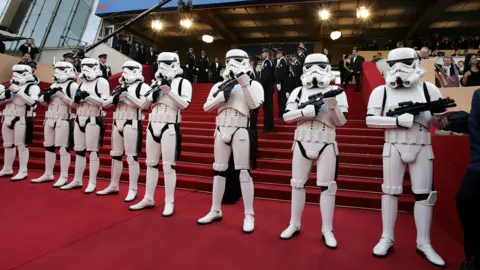 Getty Images
Getty ImagesA notable absence this year is Netflix, who had two films in competition - Okja and The Meyerowitz Stories - 12 months ago.
This year, though, its titles were excluded from competition after the streaming giant refused to guarantee them a release in French cinemas.
Many critics, meanwhile, have been dismayed by a decision to replace morning previews of films with press screenings held at the same time as their official unveilings.
The previous system often saw films receive a critical drubbing before their red-carpet premieres had even taken place.

Follow us on Facebook, on Twitter @BBCNewsEnts, or on Instagram at bbcnewsents. If you have a story suggestion email entertainment.news@bbc.co.uk.
